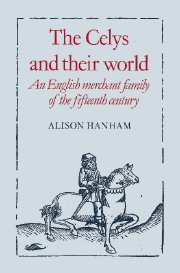Book contents
- Frontmatter
- Contents
- List of figures and tables
- Preface
- Acknowledgments
- List of abbreviations
- PART I THE CELYS AND THEIR CIRCLE, 1474–82
- PART II THE WOOL TRADE
- PART III RICHARD AND GEORGE CELY, 1482–9
- 10 Richard and George, 1482–3
- 11 ‘The world goeth on wheels’, 1482–5
- 12 Marriage and housekeeping
- 13 Warfare and trade, 1486–9
- 14 The Margaret Cely of London
- 15 Charge and discharge, the Celys' finances, 1482–9
- Postscript on later family history
- Select bibliography
- Index
11 - ‘The world goeth on wheels’, 1482–5
Published online by Cambridge University Press: 06 July 2010
- Frontmatter
- Contents
- List of figures and tables
- Preface
- Acknowledgments
- List of abbreviations
- PART I THE CELYS AND THEIR CIRCLE, 1474–82
- PART II THE WOOL TRADE
- PART III RICHARD AND GEORGE CELY, 1482–9
- 10 Richard and George, 1482–3
- 11 ‘The world goeth on wheels’, 1482–5
- 12 Marriage and housekeeping
- 13 Warfare and trade, 1486–9
- 14 The Margaret Cely of London
- 15 Charge and discharge, the Celys' finances, 1482–9
- Postscript on later family history
- Select bibliography
- Index
Summary
Before describing the Celys' domestic life in further detail, a chapter must be taken to sketch in the background of international affairs and the fortunes of the Staple trade in the years 1482 to 1485.
March 1482 had seen further negotiations dragging on between England and France: ‘upon Palm Sunday the French embassy come into London, and they were worshipfully received with the mayor and all the crafts of London’, but their entertainment was to little real purpose. There had also occurred a disaster to one of the new English ultimate weapons: ‘at afternoon [of 27 March] was the great new gun of brass shot at Mile End, 'at was made at the Tower. And it brast all to pieces.’ On that same day the Duchess Mary of Burgundy died as the result of a hunting accident. It was not long before the Estates of Flanders declared that her widower, Maximilian, was unacceptable as regent for his son, who was in the custody of the people of Ghent. In May there was word in England that Thérouanne had been burnt by the French and that Ghent and Bruges had made their own peace treaties with France, and on 31 July William Cely sent the alarming news that
the town of Aire is given up to the Frenchmen, and another castle within a Dutch mile of St Omers, by the means of treason … and the Frenchmen purposeth to be at Gravelines, and they be not letted [prevented] within this two days and less. […]
- Type
- Chapter
- Information
- The Celys and their WorldAn English Merchant Family of the Fifteenth Century, pp. 284 - 308Publisher: Cambridge University PressPrint publication year: 1985

